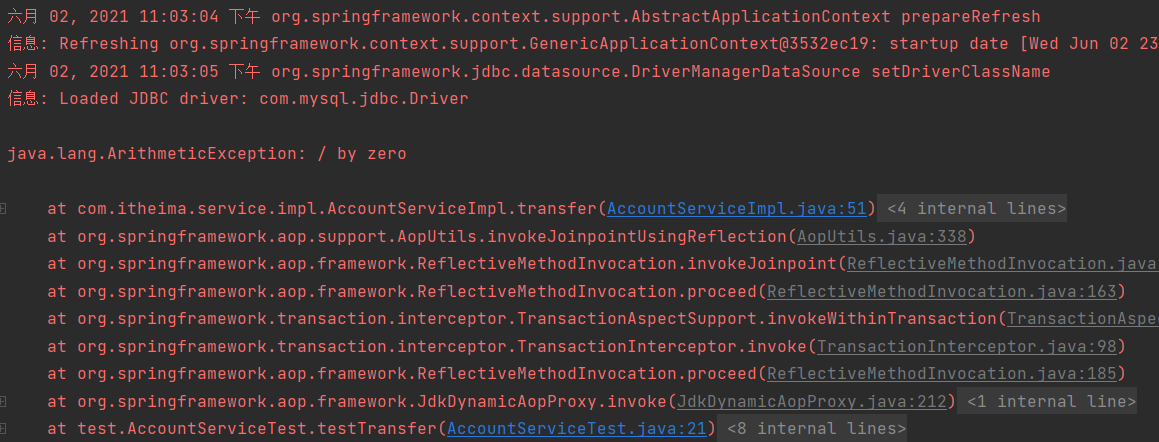Spring事务控制 Spring中的事务控制知识总结
Xiu Yan 人气:0想了解Spring中的事务控制知识总结的相关内容吗,Xiu Yan在本文为您仔细讲解Spring事务控制的相关知识和一些Code实例,欢迎阅读和指正,我们先划重点:Spring事务控制,Spring怎么控制事务,下面大家一起来学习吧。
一、环境准备
为了演示 Spring 中的事务控制,我们创建一个空项目,项目目录如下:

导入依赖:
<dependencies> <dependency> <groupId>org.springframework</groupId> <artifactId>spring-context</artifactId> <version>5.0.2.RELEASE</version> </dependency> <dependency> <groupId>org.springframework</groupId> <artifactId>spring-jdbc</artifactId> <version>5.0.2.RELEASE</version> </dependency> <dependency> <groupId>org.springframework</groupId> <artifactId>spring-tx</artifactId> <version>5.0.2.RELEASE</version> </dependency> <dependency> <groupId>mysql</groupId> <artifactId>mysql-connector-java</artifactId> <version>5.1.6</version> </dependency> <dependency> <groupId>org.aspectj</groupId> <artifactId>aspectjweaver</artifactId> <version>1.8.7</version> </dependency> <dependency> <groupId>junit</groupId> <artifactId>junit</artifactId> <version>4.12</version> </dependency> <dependency> <groupId>org.springframework</groupId> <artifactId>spring-test</artifactId> <version>5.0.2.RELEASE</version> </dependency> </dependencies>
业务层及其实现类:
/**
* 账户的业务层接口
*/
public interface IAccountService {
void transfer(String sourceName, String targetName, Float money);
}
/**
* 转账的业务层实现类
*/
public class AccountServiceImpl implements IAccountService {
private IAccountDao accountDao;
public void setAccountDao(IAccountDao accountDao) {
this.accountDao = accountDao;
}
/**
* 转账
* @param sourceName 转出账户名称
* @param targetName 转入账户名称
* @param money 转账金额
*/
public void transfer(String sourceName, String targetName, Float money) {
//1. 根据名称查询转出账户
Account source = accountDao.findAccountByName(sourceName);// 1. 第一次事务,提交
//2. 根据名称查询转入账户
Account target = accountDao.findAccountByName(targetName);// 2. 第二次事务提交
//3. 转出账户减钱
source.setMoney(source.getMoney()-money);
//4. 转入账户加钱
target.setMoney(target.getMoney()+money);
//5. 更新转出账户
accountDao.updateAccount(source); // 3. 第三次事务提交
int i = 1/0; // 4. 报异常
//6. 更新转入账户
accountDao.updateAccount(target); // 5. 事务不执行
}
}
账户持久层及其接口:
/**
* 账户的持久层接口
*/
public interface IAccountDao {
/**
* 根据Id查询账户
* @param accountId
* @return
*/
Account findAccountById(Integer accountId);
/**
* 根据名称查询账户
* @param accountName
* @return
*/
Account findAccountByName(String accountName);
/**
* 更新账户
* @param account
*/
void updateAccount(Account account);
}
/**
* 账户的持久层实现类
*/
public class AccountDaoImpl extends JdbcDaoSupport implements IAccountDao {
public Account findAccountById(Integer accountId) {
List<Account> accounts = super.getJdbcTemplate().query("select * from account where id = ?",new BeanPropertyRowMapper<Account>(Account.class),accountId);
return accounts.isEmpty()?null:accounts.get(0);
}
public Account findAccountByName(String accountName) {
List<Account> accounts = super.getJdbcTemplate().query("select * from account where name = ?",new BeanPropertyRowMapper<Account>(Account.class),accountName);
if(accounts.isEmpty()){
return null;
}
if(accounts.size()>1){
throw new RuntimeException("结果集不唯一");
}
return accounts.get(0);
}
public void updateAccount(Account account) {
super.getJdbcTemplate().update("update account set name=?,money=? where id=?",account.getName(),account.getMoney(),account.getId());
}
}
这里配置的是 Spring 内置数据源,当然也可以应用 JdbcTemplate。
bean.xml:
<?xml version="1.0" encoding="UTF-8"?>
<beans xmlns="http://www.springframework.org/schema/beans"
xmlns:xsi="http://www.w3.org/2001/XMLSchema-instance"
xmlns:aop="http://www.springframework.org/schema/aop"
xmlns:tx="http://www.springframework.org/schema/tx"
xsi:schemaLocation="
http://www.springframework.org/schema/beans
http://www.springframework.org/schema/beans/spring-beans.xsd
http://www.springframework.org/schema/tx
http://www.springframework.org/schema/tx/spring-tx.xsd
http://www.springframework.org/schema/aop
http://www.springframework.org/schema/aop/spring-aop.xsd">
<!--配置业务层-->
<bean id="accountService" class="com.itheima.service.impl.AccountServiceImpl">
<property name="accountDao" ref="accountDao"></property>
</bean>
<!-- 配置账户的持久层-->
<bean id="accountDao" class="com.itheima.dao.impl.AccountDaoImpl">
<property name="dataSource" ref="dataSource"></property>
</bean>
<!-- 配置数据源-->
<bean id="dataSource" class="org.springframework.jdbc.datasource.DriverManagerDataSource">
<property name="driverClassName" value="com.mysql.jdbc.Driver"></property>
<property name="url" value="jdbc:mysql://localhost:3306/springdb"></property>
<property name="username" value="root"></property>
<property name="password" value="000000"></property>
</bean>
</beans>
二、基于 XML 的事务控制
Spring 中基于 xml 的声明式事务控制配置步骤
1.配置事务管理器
<!--配置事务管理器--> <bean id="transactionManager" class="org.springframework.jdbc.datasource.DataSourceTransactionManager"></bean>
2.配置事务的通知 (需要导入事务的约束 tx 和 aop 的名称空间和约束)
使用 tx:advice 标签配置事务通知
属性:
id:给事务通知起一个唯一标识
transaction-manager:给事务通知提供一个事务管理器引用
<!--配置事务的通知--> <tx:advice id="txAdvice" transaction-manager="transactionManager"></tx:advice>
3.配置AOP的通用切入点表达式
<!--配置AOP的通用切入点表达式--> <aop:config> <aop:pointcut id="pt1" expression="execution(* com.itheima.service.*.*(..))"></aop:pointcut> </aop:config>
4.建立事务通知 与 切入点表达式的对应关系
<!--配置AOP的通用切入点表达式--> <aop:config> <aop:pointcut id="pt1" expression="execution(* com.itheima.service.*.*(..))"></aop:pointcut> <aop:advisor advice-ref="txAdvice" pointcut-ref="pt1"></aop:advisor> </aop:config>
5.配置事务的属性
在事务的通知 tx:advice 标签的内部
- isolation: 用于指定事务的隔离级别。默认值是DEFAULT,表示使用数据库的默认隔离级别。
- propagation: 用于指定事务的传播行为。默认值是REQUIRED,表示一定会有事务,增删改的选择。查询方法可以选择SUPPORT。
- read-only: 用于指定事务是否只读。只有查询方法才能设置为true。默认值时false,表示读写。
- timeout: 用于指定事务的超时时间。默认值是-1,表示永不超时。如果指定了数值,则以秒为单位。
- rollback-for: 用于指定一个异常,当产生该异常时,事务不回滚,产生其他异常,事务不回滚。没有默认值。表示任何异常都回滚。
- no-rollback-for: 用于指定一个异常,当产生该异常时,事务不回滚,产生其他异常时,事务回滚。没有默认值。表示任何异常都回滚。
<!--配置事务的通知-->
<tx:advice id="txAdvice" transaction-manager="transactionManager">
<tx:attributes>
<tx:method name="*" propagation="REQUIRED" read-only="false"></tx:method>
<tx:method name="find*" propagation="REQUIRED" read-only="false"></tx:method> <!--优先级高于通配符 * -->
</tx:attributes>
</tx:advice>
最终 bean.xml:
<?xml version="1.0" encoding="UTF-8"?>
<beans xmlns="http://www.springframework.org/schema/beans"
xmlns:xsi="http://www.w3.org/2001/XMLSchema-instance"
xmlns:aop="http://www.springframework.org/schema/aop"
xmlns:tx="http://www.springframework.org/schema/tx"
xsi:schemaLocation="
http://www.springframework.org/schema/beans
http://www.springframework.org/schema/beans/spring-beans.xsd
http://www.springframework.org/schema/tx
http://www.springframework.org/schema/tx/spring-tx.xsd
http://www.springframework.org/schema/aop
http://www.springframework.org/schema/aop/spring-aop.xsd">
<!--配置业务层-->
<bean id="accountService" class="com.itheima.service.impl.AccountServiceImpl">
<property name="accountDao" ref="accountDao"></property>
</bean>
<!--配置账户的持久层-->
<bean id="accountDao" class="com.itheima.dao.impl.AccountDaoImpl">
<property name="jdbcTemplate" ref="jdbcTemplate"></property>
</bean>
<!--配置jdbcTemplate-->
<bean id="jdbcTemplate" class="org.springframework.jdbc.core.JdbcTemplate">
<property name="dataSource" ref="dataSource"></property>
</bean>
<!-- 配置数据源-->
<bean id="dataSource" class="org.springframework.jdbc.datasource.DriverManagerDataSource">
<property name="driverClassName" value="com.mysql.jdbc.Driver"></property>
<property name="url" value="jdbc:mysql://localhost:3306/springdb"></property>
<property name="username" value="root"></property>
<property name="password" value="000000"></property>
</bean>
<!--配置事务管理器-->
<bean id="transactionManager" class="org.springframework.jdbc.datasource.DataSourceTransactionManager">
<property name="dataSource" ref="dataSource"></property>
</bean>
<!--配置事务的通知-->
<tx:advice id="txAdvice" transaction-manager="transactionManager">
<tx:attributes>
<tx:method name="*" propagation="REQUIRED" read-only="false"></tx:method>
<tx:method name="find*" propagation="REQUIRED" read-only="false"></tx:method>
</tx:attributes>
</tx:advice>
<!--配置AOP的通用切入点表达式-->
<aop:config>
<aop:pointcut id="pt1" expression="execution(* com.itheima.service.*.*(..))"></aop:pointcut>
<aop:advisor advice-ref="txAdvice" pointcut-ref="pt1"></aop:advisor>
</aop:config>
</beans>
测试结果:

三、基于注解的事务控制
Spring 中基于 xml 的声明式事务控制配置步骤
1.配置事务管理器
2.开启 Spring 对注解事物的支持
3.在需要事务支持的地方使用 @Transactional 注解
bean.xml:
<?xml version="1.0" encoding="UTF-8"?>
<beans xmlns="http://www.springframework.org/schema/beans"
xmlns:xsi="http://www.w3.org/2001/XMLSchema-instance"
xmlns:aop="http://www.springframework.org/schema/aop"
xmlns:tx="http://www.springframework.org/schema/tx"
xmlns:context="http://www.springframework.org/schema/context"
xsi:schemaLocation="
http://www.springframework.org/schema/beans
http://www.springframework.org/schema/beans/spring-beans.xsd
http://www.springframework.org/schema/tx
http://www.springframework.org/schema/tx/spring-tx.xsd
http://www.springframework.org/schema/aop
http://www.springframework.org/schema/aop/spring-aop.xsd
http://www.springframework.org/schema/context
http://www.springframework.org/schema/context/spring-context.xsd">
<!--配置容器时要扫描的包-->
<context:component-scan base-package="com.itheima"></context:component-scan>
<!--配置JdbcTemplate-->
<bean id="jdbcTemplate" class="org.springframework.jdbc.core.JdbcTemplate">
<property name="dataSource" ref="dataSource"></property>
</bean>
<!-- 配置数据源-->
<bean id="dataSource" class="org.springframework.jdbc.datasource.DriverManagerDataSource">
<property name="driverClassName" value="com.mysql.jdbc.Driver"></property>
<property name="url" value="jdbc:mysql://localhost:3306/springdb"></property>
<property name="username" value="root"></property>
<property name="password" value="000000"></property>
</bean>
<!--配置事务管理器-->
<bean id="transactionManager" class="org.springframework.jdbc.datasource.DataSourceTransactionManager">
<property name="dataSource" ref="dataSource"></property>
</bean>
<!--开启spring对注解事物的支持-->
<tx:annotation-driven transaction-manager="transactionManager"></tx:annotation-driven>
</beans>
账户业务层实现类:
/**
* 转账的业务层实现类
*/
@Service("accountService")
@Transactional
public class AccountServiceImpl implements IAccountService {
......
}
账户持久层实现类:
/**
* 账户的持久层实现类
*/
@Repository("accountDao")
public class AccountDaoImpl implements IAccountDao {
@Autowired
private JdbcTemplate jdbcTemplate;
......
}
测试结果如下:

加载全部内容